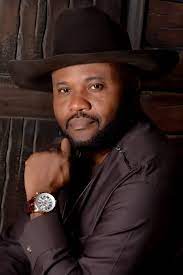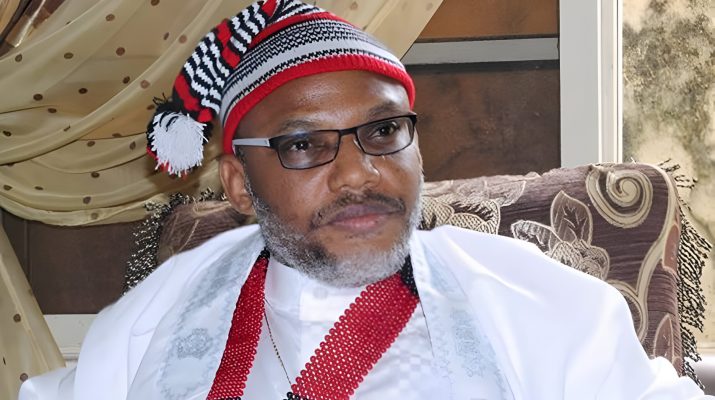As Nnamdi Kanu declines to enter his defence against the Federal Government terrorism Charges against him, insisting he has no case to answer, legal experts stress that having been discharged and acquitted by the Court of Appeal in 2022, the Supreme Court returned him to the High Court in defiance of the provisions of the country’s Constitution
By Udoka Ekeleme, Abuja
For Dan Nwanyanwu, leader of the Zenith Labour Party, the Federal Government has no case against the leader of the Indigenous People of Biafra (IPOB), Mazi Nnamdi Kanu. Nwanyanwu insisted that the continued detention and trial of Kanu remained part of the marginalization of the South east region by the Federal Government. He described the trial of Kanu as the government’s way of treating the Igbo of the South east as second class citizens.
Speaking on a recent interview last week on Africa Independent Television’s ”Kaakaki”, Nwanyanwu accused the Federal Government of double standard, and argued that while government was pampering terrorists and bandits who have been killing citizens in the North, the same government is trying Kanu for terrorism offences even when he had not carried gun to kill or sent anyone to kill on his behalf.
Nwanyanwu, a lawyer, had said, “Nnamdi Kanu has not committed any offence. Federal Government should release Nnamdi Kanu because he has no case to answer.
”What Nnamdi Kanu was saying is, ‘treat us as you treat others; we’re not second class citizens’”.

Kanu, the leader of the Indigenous People of Biafra (IPOB), also refused to open his defence in the terrorism charge filed against him. At the resumed proceedings on Monday October 27, 2025, Kanu who has opted to defend himself after sacking his team of lawyers, said he has gone through his case file and there was no charge against him.
Kanu told the court, “Join me in praising God. I have gone through my case file, and there is no charge against me.
“There is no extant law in this country upon which the prosecution can predicate the charges against me. If there’s any, let my Lord read it out to me.
“So, I should not enter any defence in a charge that does not exist under any law in Nigeria. I urge you to release me today or grant me bail.”
But Justice James Omotosho, the presiding judge interjected and said that Kanu needed to understand certain procedures of the law.
He said in a criminal trial, after the prosecution has closed its case, three things are open to the defendant. He is expected to file a no-case submission, and if the no-case submission is not sustained, the defendant is expected to put in a defence.
Omotosho said if the defendant chooses not to put in a defence, he has opted to rely on the case of the prosecution.
But Kanu insisted that there is no charge against him and that the trial judge should release him or grant him bail because he is ill.
“I am being detained under a fraudulent charge that the Supreme Court has said it ought not to be,” he said.
A lawyer, Barrister Njoku Jude Njoku, has also agreed with Kanu that the Supreme Court erred in remitting the terrorism trial after his acquittal by the Court of Appeal.
Njoku, a Consultant to the Mazi Nnamdi Kanu Global Defence Consortium, a group of lawyers fighting for the freedom of the IPOB leader, made the assertion in a statement issued in Abuja last week.
The statement came in the wake of Kanu’s refusal to enter his defense after the Nigerian government closed its case against him, Kanu insisted that the prosecution has no case against him, and his defense team argued that his earlier acquittal by the Court of Appeal on October 13, 2022, had nullified his trial.
In the statement titled “A Devastating Critique: The Nigerian Supreme Court’s Unlawful Remittal of Nnamdi Kanu’s Case, the Inviolability of Section 36(9) Immunity, and the Universal Doctrine of Finality of Appellate Discharge,” Njoku faulted the December 15, 2023, decision of the apex court to remit Kanu’s case back to the Abuja Federal High Court for continuation of the Biafra agitator’s trial.
According to Njoku, the decision violated the doctrine of finality of appellate discharge.
He described the apex court’s action as constitutional perversity, noting that the Nigerian Constitution is superior to the Supreme Court,
“The Supreme Court’s decision of 15 December 2023, purporting to remit a charge already extinguished by the Court of Appeal’s lawful discharge of 13 October 2022, constitutes a blatant constitutional perversity that strikes at the very foundation of the rule of law and offends the universal, inviolable Doctrine of Finality of Appellate Discharge, a bedrock principle of common-law jurisprudence recognised across the globe.
“While it is accepted that ‘the law is what the Supreme Court says it is’ in the interpretive hierarchy, this maxim yields inexorably to the supremacy of the Constitution under Sections 1(1) and 1(3), the Constitution is the supreme law, not the Supreme Court, The non-derogable immunity conferred by Section 36(9) upon a person discharged by a court of competent jurisdiction is self-executing, absolute, and beyond the reach of any judicial organ, including the apex court.
“Once the Court of Appeal pronounced discharge, Mazi Nnamdi Kanu became constitutionally untouchable for the same offences, the prosecution was extinguished at its root, and jurisdiction to retry him permanently lost (FRN v. Ifegwu (2003) 15 NWLR (Pt 842) 113 at 175, Abacha v. Fawehinmi (2000) 6 NWLR (Pt 660) 228),”.
According to the lawyer, by remitting a nullified, vitiated charge without reversing the finding of illegal rendition, convicting the defendant, or identifying new facts, the Supreme Court did not interpret the law, it violated it, and in doing so, trampled upon the Doctrine of Finality of Appellate Discharge, a doctrine inviolable in every common-law jurisdiction worldwide.
Citing legal authorities from England, (R v. Pinfold [1843] 5 Man & G 463, R v. Green [1950] 1 All ER 786), Njoku stressed that “once an appellate court quashes a conviction or discharges, the Crown is barred from retrying the same offence,” He also highlighted a similar example from Canada, (R v. Riddle [1980] 1 SCR 257), arguing that appellate acquittal is final and conclusive,
In the same vein, he cited a case decided by an Australian court, (Davern v. Messel (1984) 155 CLR 21), to back the argument that “finality attaches immediately upon appellate discharge, the principle is immutable, an appellate discharge terminates the lis with absolute finality, no superior court may revive it without new evidence or distinct charges”.
Insisting that the October 13, 2022, decision of the Court of Appeal, which acquitted Kanu, had nullified his trial, the statement added.
“In Nigeria, this doctrine is constitutionally enshrined in Section 36(9) and judicially fortified (Dokubo-Asari v. FRN (2007) 12 NWLR (Pt 1048) 320 at 375, appellate discharge ‘ends the matter finally and irrevocably’), The Supreme Court’s remittal is thus not merely erroneous, it is jurisdictionally impossible, a global jurisprudential heresy, This was not judicial discretion, it was judicial overreach masquerading as appellate review.
“The ‘unless set aside by a superior court’ doctrine, properly confined to hierarchical obedience under Section 287, cannot be weaponized to pierce a constitutional immunity that operates outside and above the judicial pyramid, nor can it breach the universal finality of appellate discharge, To hold otherwise is to elevate the Supreme Court above the Constitution it swore to uphold and above the common-law world’s sacred principle of finality, rendering Section 36(9) a mere suggestion and Section 1(3) a dead letter.
“Such perverse remittal is void ab initio, constitutionally inexcusable, and an affront to the immutable principle that no court, not even the Supreme Court, may derogate from a fundamental right in clear terms, for in Nigeria and across the common-law universe, the Constitution reigns supreme, the appellate discharge is final, and Mazi Nnamdi Kanu stands immune”.
Also reacting to Kanu’s perceived illegal trial, the Sarkin Hausawa of Amawbia community in Awka South Local Government Area of Anambra State, Alhaji Mahmud Sani, has stated that Kanu has a constitutional right to agitate for self-determination, provided he does so peacefully and within the law.
Speaking with journalists in Amawbia near Awka on Thursday October 30, 2025, Alhaji Sani said that detaining or prosecuting Kanu solely for advocating self-determination would amount to a violation of his fundamental human rights as guaranteed by the Nigerian Constitution, unless violence was involved in the process.
According to him, “There is nothing wrong constitutionally for anyone to agitate for self-determination. It is, however, left for his fellow Southeasterners to either support him or not. From my observation, the problem he is facing seems to stem from the fact that not all his people are in agreement with him.”




